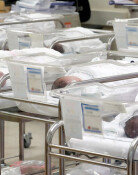Loopholes in North Korean defector management
Loopholes in North Korean defector management
Posted October. 15, 2013 06:41,
It turned out that 796 out of 22,560 North Korean defectors turned out to have gone missing, and 689 of them are staying in a third country. Even a few of them returned to North Korea or held in detention centers. As many as 26 people committed suicide due to economic difficulties and failure to adapt to the South Korean environment. This shows many loopholes in the management of North Korean defectors.
North Korean defectors who settled down in South Korea account for 81.3 percent (126 cases) out of 155 cases in which countries that received applications from Koreans to be recognized as refugees for the recent five years requested fingerprints for confirmation. They could use a refugee program to emigrate to a third country without living in South Korea. Fifty one North Korean defectors who came to the South chose to migrate to other countries. As North Korean defectors have freedom to choose a place where they want to live, the South Korean government cannot ban them from moving to a third country.
The problem is that they are taking relatively generous subsidies for North Korean defectors from the South Korean government and bringing them to a third country. The South Korean government offers a North Korean defector a subsidy ranging from 20 million won (18,660 U.S. dollars) to 48 million won (44,780 dollars) in the name of settlement, residential assistance, vocation training, social welfare, and education assistance. If a four-member family learns in vocation trainings and takes social welfare benefits, they can obtain more than 100 million won (93,200 dollars). Some North Korean defectors exaggerate in other countries that South Korean society persecutes them politically and discriminate them with severe social prejudice to be recognized as refugees.
Brokers for fake asylum are in a booming business. The U.K., which has been active in accepting North Korean defectors, asked Seoul to bring fake asylum seekers back. Canada designated South Korea as a country of special interest and strengthened an asylum-seeker screening process. It is shocking that 21 out of 49 North Korean spies or 42.9 percent sneaked into South Korea disguising themselves as North Korean defectors for the past 10 years since 2003. They had a mission to monitor North Korean defectors and kidnap them to bring them to the North. As the number of North Korean spies disguised in North Korean defectors increases, real North Korean defectors are disadvantaged. North Korean defector spies could kidnap or attempt a terrorist attack against South Korean celebrities or those who criticize the North Korean regime.
Headline News
- N. Korea launches cyberattacks on S. Korea's defense companies
- Major university hospital professors consider a day off each week
- Italy suffers from fiscal deficits from ‘Super Bonus’ scheme
- Inter Milan secures 20th Serie A title, surpassing AC Milan
- Ruling and opposition prioritize spending amid tax revenue shortfalls







